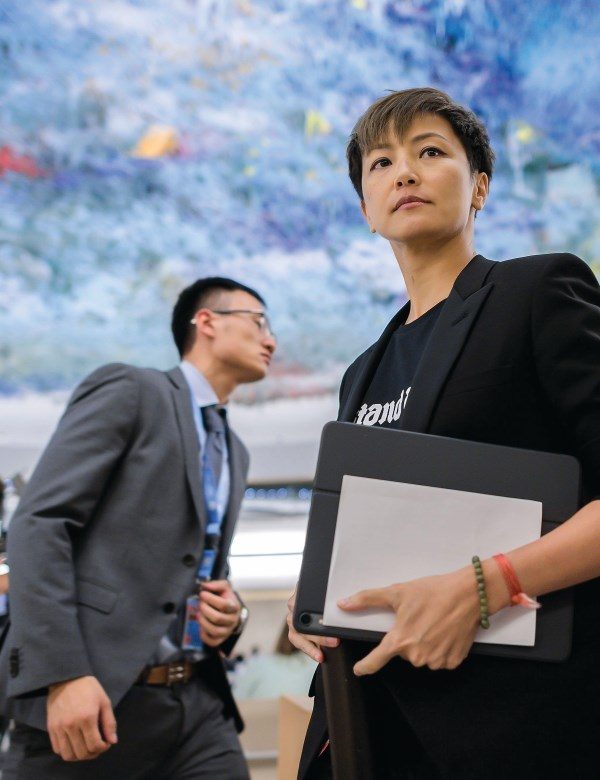Cantopop princess Denise Ho never came out to her parents, but in 2012 she made a snap decision to come out to the world. Today she’s a frontline LGBTQ activist in Hong Kong, leading the charge for democracy and human rights
When we connect on Skype for our interview, Denise Ho looks picture-perfect.
Sporting a crisp white shirt and a cropped blond hairdo, the cantopop celebrity is warm, bubbly, but short on time. She only has 15 minutes to spare, because another media team will be coming to set up shortly.
She is incredibly articulate and confident—probably because she lived in Montreal, Quebec, with her family during her teenage years.
“It was a very important period for me. I got a lot of my values and ways of thinking from that time,” she remembers.
It was in Montreal, around age 17, Ho remembers, that she knew she liked girls. And while she never had that talk with her parents, she says she gave them “a very long period of time to get used to the idea.”
The same female friend had been visiting for years, but her parents never asked her any questions. And with her music career taking off, “of course I had all these songs about two girls, or two boys, I guess they just gradually knew,” Ho smiles.
“I think the most important thing is that I showed them I knew what I was doing in my career, and I could take care of myself. But of course it’s very controversial in Hong Kong. For some people it’s still very difficult.”
Ho says she often tells fans who are having a difficult time with their parents to take her advice—give them time, and show them what you’re worth in every other part of life.
But it’s a battle the Chinese LGBTQ community at large is still fighting. With no antidiscrimination laws in place, many people still face constant bullying and harassment. It’s this wider issue that Ho dedicates most of her activism to.
Back in 2012, a recommendation for an antidiscrimination bill was made to the government, but was immediately shut down without any public consultation. Since the Chinese public had no voting power, the motion couldn’t be argued.The event changed everything for Ho.
“I realised we had a legislative system that was very rigged and favourable to the government, so I was very angry. I made a quick decision to come out a few days after I saw the news . . . and that was the beginning of this whole journey.”
It was a groundbreaking moment: Ho became the first female celebrity to come out publicly in China.
Part of her inspiration was Anthony Wong, a fellow Chinese singer who had come out just six months earlier, and was the first male celebrity to do so. At this point, the pair joined forces to create their nonprofit organisation, Big Love Alliance.
Several years on, the group has hundreds of members, a board that includes Chinese legislators, and an alliance with the Singapore-based group Pink Dot, to widen their reach. And although Big Love Alliance began in response to a political injustice, Ho says currently the focus is on community outreach and education. With the Communist “one country, two systems” arrangement in place, there’s little hope of influencing politics at this stage, she explains.
“We don’t have universal suffrage [full voting rights] in Hong Kong . . . and without democracy we can’t really do much about LGBTQ rights.” In fact, being open about her sexuality and political views has had the opposite effect—instead of inspiring others, it’s backfired and cost her dearly.
Since 2012, Ho has been banned from performing in mainland China, where previously she had performed to thousands of fans in sold-out concerts. She’s also reportedly been dropped from promotional sponsors as a result of her public views. A similar fate has befallen her colleague Anthony Wong, who has had his music censored since he came out in 2012.
In China, disagreeing with the government has dire consequences, and the fear-mongering is real.
“China has been tightening the grip on Hong Kong and also using its economic power to shut a lot of people up. They’re also violating human rights,” Ho says.
And while Chinese politics may not seem like an issue that we over here need to worry about, she believes it’s creating problems for the whole world. “You see whole countries and different people silencing themselves because they don’t want to be on the wrong side of China,” she says.
“We see the way China has been ignoring the promises they made with the British government [to progress toward democracy], and the way they have been treating the Uyghurs in Xinjiang, and so on. Then they are shutting people up with their financial power . . . and of course they are in alliance with other countries.
“Should we conform with these countries? I think that if you believe in human rights and humanity, we have to stand up. And it’s up to the people to speak up—the governments have their hands tied because of the benefits they might get from these big countries.” But amid it all there’s a silver lining, Ho says. “I believe a lot of people have been awakened. When you see the government being more and more suppressive, and ignoring all these things that are happening, people get very angry. That is why this whole young generation has stood up [in recent protests], the way people like us in older generations have stood up . . . it hasn’t always been like that.
“I guess the way the government has been treating people has caused a lot of awakening.”
